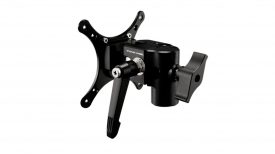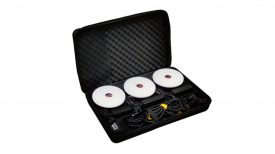
Freewell has released a range of variable ND filters up to 82mm in diameter.
Freewell is well known for drone and action camera filters, but earlier this year they launched a Magnetic Quick Swap Filter System for DSLR and mirrorless cameras (which we reviewed). At the time I was puzzled as to why they were only offering high strengths of fixed ND and not variable ND filters.

Well, it seems they have been listening. Freewell now has a DSLR/Mirrorless Hard Stop Variable ND filter, 2-5 Stop, 6-9 Stop 2 Pack.

Freewell will originally be offering variable ND filters in sizes of 67mm, 72mm, 77mm, and 82mm.

Freewell is also now making a range of step-up rings.
Why do they have a range of 4 stops of ND?

I asked Freewell this exact question and they told me that it was to avoid cross-polarization.
Now, there is a bit of a caveat with these filters. They are only offered in 2-5 stops and 6-9 stops. I found this to be somewhat of a problem. In a lot of cases, 5 stops weren’t quite enough when I was shooting outdoors on a sunny day. This meant that I was constantly switching back and forth between the 2-5 stop and the 6-9 stop versions of the filter. With other variable ND filters that offer from 1/1.33 up to 6-8 stops, this is something you don’t have to do.
Speaking of the minimum amount of ND, most variable ND filters start at either 1 or 1.33 stops, the Freewell starts at 2. The trouble is, you often just want a little bit of ND on overcast days and 2 stops are going to be too much on some occasions.
If you look at the Freewell Variable ND filters they only have a range of 4 stops, which doesn’t make them as versatile as a lot of other available options. It also means that you have to carry around 2 filters instead of just one if you want to cover most lighting conditions.
Build Quality
The filters are quite thin for a variable ND and that’s a good thing. If you are using filters with step up rings you can run into vignetting problems if the variable ND filter is quite thick. As the profile of the Freewell filters is small, you don’t get any vignetting even when using wide lenses.

The downside of being too thin is I did find it hard on occasion to turn the front ring to adjust the amount of ND. When you are in a hurry, this can be a problem. I sometimes found myself unscrewing the filter instead of adjusting the amount of ND.

The ND stops that are labeled on the filter are also a little small and not always easy to see. I saying that I didn’t find that inhibited the way I used the filters. Usually, with variable ND you just make an adjustment without looking at the filter anyway.

According to Freewell, the filters are made of really high definition multicoated optical glass and they are claimed to be scratchproof, waterproof, dustproof, and oilproof.
Are the markings accurate?

The Freewell Variable ND filters are marked in stops. To see if they are accurate I exposed an image correctly without any ND to give me a reference F stop from which to start. I then attached the Freewell filter to check the accuracy of the markings. If for example, my reference was F8, if I added 2 stops of ND I should get a properly exposed image by opening the iris to F4.
I found at 2 stops it was fairly accurate, although it was around 1/3 stop above being spot on. Once I moved to 4 stops, it was closer to being 2/3 stop higher than it should have been.
How do they perform?
The Freewell variable ND filters are not completely color neutral, but few variable NDs are. While they are accurate on a vectorscope I found that the overall look of the image was slightly green.
It’s not that the color shift is bad, but you do have to keep in mind when using the filters that the overall look of your image will change.
How do they compare to other variable ND filters?
I decided to pit the Freewell against the SLR Magic 82mm Self-Locking Variable Neutral Density 0.4 to 1.8 Filter (1.3 to 6 Stops). Now, the Freewell only goes from 2-5 stops, but the SLR Magic goes from 1.3-6. In theory, the Freewell should have the advantage because it only has to cover 4 stops, while the SLR Magic needs to cover 5.7 stops.
The trouble with the SLR Magic filter is it is badly marked. Despite offering 1.3 to 6 stops of ND, the filter is marked from 1-10. I’m not sure why they did it this way, it makes no sense. I needed to do a bit of math to work out where 2,3,4 and 5 stops fell.

I did a test where I white balanced a Panasonic S1H with no ND and shot an X-Rite color checker chart. This gave me my reference image. I then tested out the Freewell and the SLR Magic at a variety of stops to see if there was any color shift.
Both the Freewell and the SLR Magic had slight color shifts. What is interesting when you do these sorts of tests is that just because something looks good on a scope, doesn’t mean the image actually looks pleasing to the eye.

Freewell Variable ND Filter 2-5 stops 
No ND
The Freeewell, if you look on a vectorscope, was just about dead-on accurate.

Freewell Variable ND Filter 2-5 stops 
No ND- base reference image
Now, whether you like how the colors were being replicated on the color chart is a personal decision. White was still white, black was still black, but the overall look was a little greener and warmer than that of the base image that was white balanced with no ND being used.

Freewell Variable ND Filter 2 stops 
Freewell Variable ND Filter 5 stops
The Freewell’s color response remained fairly neutral across its 2-5 stop range.

SLR Magic 
No ND 
SLR Magic 
No ND- base reference image
With the SLR Magic, the image tended to have a slight push towards blue. Again white still looked white and black still looked black.

Freewell Variable ND Filter 5 stops 
SLR Magic 5 stops
At the end of the day, I wouldn’t say that the Freewell looked better than the SLR Magic or that the SLR Magic looked better than the Freewell. However, I personally liked the image I was getting when using the SLR Magic. Both did a pretty good job. Yes, they both introduced a color shift, but it wasn’t a bad color shift. I would recommend when you apply any ND filter, variable or fixed, that you do a white balance.
Price

Below you can see the introductory pricing for the filters. They are now available to purchase. Check your local Amazon to find them.
- Standard Day 2-5 Stop:$109.99 USD (later will be updated to USD 129.99)
- Bright Day 6-9 Stop: $109.99 USD (later will be updated to USD 129.99)
- All Day 2-5 Stop & 6-9 Stop: $199.99 USD (later will be updated to USD 249.00)
Conclusion
The Freewell Variable ND filters certainly get the job done. They produce reasonably good results. In one way I like that the filters won’t cause any cross-polarization, but on the other hand, the ranges of 2-5 stops and 6-9 mean you will be constantly swapping over filters.
The filters are competitively priced.
If you are in the market for a variable ND filter they are certainly worth considering.








